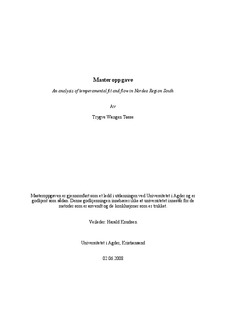| dc.description.abstract | This thesis discusses how people’s temperamental preferences and organisational demands
influence each other, and explores how a fit between preferences and demands (later referred
to as temperamental fit) can lead to positive effects for both the organisation and the
employees. Temperamental fit is based on people’s preferences for multitasking, punctuality,
deadlines, schedules, urgency and flexibility, and the corresponding demand from the
organisation’s system and technology.
It also explores the link between temperamental fit and flow, where flow is a mental state that
leads to efficiency, innovation and knowledge creation. To achieve growth and improve
services, organisations have increased their focus on efficiency, innovation and knowledge
creation. Understanding that temperamental fit can improve an organisation’s service, and
how flow can lead to better efficiency, can be an important source of competitive advantage.
This thesis is a part of a larger study conducted by Harald Knudsen and Jonny Holbek about
”Chronicity, Rhythm and Flow in Knowledge Intensive Work” The case in this study is based
on Nordea Kristiansand because they have experienced how the increasing pressure for
knowledge creation and efficiency has influenced their organisation, and they hope to gain
further understanding of the preconditions for work satisfaction and knowledge creation.
The paper is both quantitative and qualitative. The quantitative aspect is based on an
electronic questionnaire answered by 65 employees in Nordea Region South have answered.
The qualitative aspect is based on the knowledge gained from interviews with three different
employees’ in Nordea. The interviews aimed to understand people’s perception of flow, and
how findings in this study can be used to gain a better temperamental fit and achieve better
flow in Nordea Kristiansand. Through knowledge acquired from this study it was found that
to achieve better temperamental fit Nordea might try to focus more on their use of schedules
and flexible work hours. Employees seem to be susceptible to more extensive use of
schedules. By using schedules to organise the time use in different blocks of activities,
Nordea Kristiansand can increase efficiency at work, and this can again lead to a decreasing
demand to use extra work hours. Nordea, employees and customers can gain from this
knowledge. | en |
